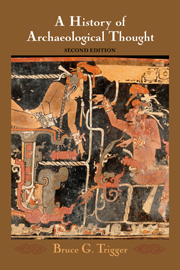Book contents
- Frontmatter
- Contents
- LIST OF ILLUSTRATIONS
- PREFACE TO THE SECOND EDITION
- 1 Studying the History of Archaeology
- 2 Classical and Other Text-Based Archaeologies
- 3 Antiquarianism without Texts
- 4 The Beginnings of Prehistoric Archaeology
- 5 Evolutionary Archaeology
- 6 Culture-Historical Archaeology
- 7 Early Functional-Processual Archaeology
- 8 Processualism and Postprocessualism
- 9 Pragmatic Synthesis
- 10 The Relevance of Archaeology
- BIBLIOGRAPHICAL ESSAY
- REFERENCES
- INDEX
5 - Evolutionary Archaeology
Published online by Cambridge University Press: 05 June 2014
- Frontmatter
- Contents
- LIST OF ILLUSTRATIONS
- PREFACE TO THE SECOND EDITION
- 1 Studying the History of Archaeology
- 2 Classical and Other Text-Based Archaeologies
- 3 Antiquarianism without Texts
- 4 The Beginnings of Prehistoric Archaeology
- 5 Evolutionary Archaeology
- 6 Culture-Historical Archaeology
- 7 Early Functional-Processual Archaeology
- 8 Processualism and Postprocessualism
- 9 Pragmatic Synthesis
- 10 The Relevance of Archaeology
- BIBLIOGRAPHICAL ESSAY
- REFERENCES
- INDEX
Summary
Few of us can observe such indications of the habits and physical condition of the earliest inhabitants of this island [Britain] as are afforded by the remains of their rude dwellings, and by the rude implements occasionally found, without a sense of thankfulness that our lot has been mercifully cast in times of improved knowledge, of advanced civilization, and more refined habits.
earl of devon, “Inaugural Address” at Exeter Congress, 1873, Archaeological Journal 30 (1873), p. 206A shared commitment to an evolutionary approach promoted a close alignment between prehistoric archaeology and ethnology in western Europe and the United States beginning in the 1860s. In Europe, the foundation for this alignment was the belief in unilinear cultural evolution forged a century earlier by Enlightenment philosophers. It was accepted that arranging modern cultures in a series from simplest to most complex illustrated the earlier stages through which the most advanced cultures had developed in prehistoric times. French and British Palaeolithic archaeologists did not try harder to elucidate the past using archaeological data because their commitment to unilinear evolutionism led them to believe that ethnology revealed almost everything they wished to know about prehistoric times.
In the United States, where it was assumed that relatively little cultural evolution had occurred in prehistoric times, archaeology, ethnology, physical anthropology, and linguistics had begun by the 1840s to be regarded as different branches of anthropology, which was identified as the study of American indigenous peoples.
- Type
- Chapter
- Information
- A History of Archaeological Thought , pp. 166 - 210Publisher: Cambridge University PressPrint publication year: 2006



